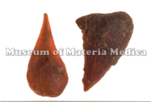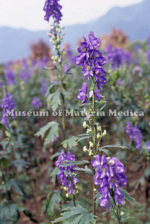Processed Aconite Root

|
Market name:炮附子 Photo location:Museum of Materia Medica, Inst. of Nat. Med. TMPW No.:9410 |

|
Plant name:Aconitum carmichaeli Photo location:Sichuan Prov., China Photo date:2002 Photographer:K. Komatsu |
| Synonym | |
| Latin name | Aconiti Radix Processa |
| Botanical source: Family name | Ranunculaceae |
| Botanical source: Plant name | - Aconitum carmichaelii Debeaux (IPNI:707241-1) - Aconitum japonicum Thunberg (IPNI:707472-1) |
| Part used | Lateral root |
| Empirical criteria for quality selection | The best one is the size of hen's egg. (NI) |
| Constituents | Alkaloids: [A. carmichael]i: Aconitine, Hypaconitine, Mesaconitine, Carmichaeline, Talatisamine, Coryneine chloride; [A. japonicum]: Aconitine, Mesaconitine, Hypaconitine, Hygenamine; [Aconitum spp.]: Aconitine系 (type):Aconitine, Hypaconitine, Mesaconitine, Jesaconitine, Neopelline, Atisin系 (type):Atisine, Kobusine, Pseudokobusine, Telatisine, Songorine, Atidine, Napelline, Heteratisine, Hypognavine, Ignavine, 強心成分 (Cardiotonic compounds):Hygenamine, Coryneine, Yokonoside, etc.; [A. ferox]: Pseudoaconitine; [A. heterophyllum]: Atidine, Atisine, Hetisine, Heteratisine, Benzoylheteratisine; [A. napellus]: Songorine, Napelline, Hypaconitine, Mesaconitine, Neopelline, Neoline, Aconine, Benzoylaconine, Aconitine, Napellonine |
| Pharmacological effects | Sedative, suppression of stress ulcer (extract). Sedative, hypotensive, induction of arrythmia (aconitine), cardiotonic (hygenamine, coryneine). Analgesic and antiinflammatory (mesaconitine). |
| Indications | As a tonic, diuretic, cardiotonic and painkiller, it is applied to treat metabolic dysfunction, joint paralysis and pain of limbs and disease due to relaxation of internal organs such as invalid's stomachache, diarrhea and pollution. |
| Diseases | Pallor of the face, Cyanosis, Coldness of limbs, Weak pulse, Spontaneous sweating, Heaviness and powerlessness in lumber and knee, Frequent urination, Sexual problem, Muddy and watery stool, Lower back pain, Oliguria, Full stomach, Swelling and pain of joint, Numbness, Chill |
| Formulas | |
| Meridian tropism | Heart, Spleen, Kidney |
| Property | Extremely hot, toxic |
| Flavor | Extremely Acrid/pungent |
| Classification in "Shen-non Ben-cao Jing" | Inferior |
| TCM: Classification | Drugs for dispelling cold |
| TCM: Medicinal effects | To cause restoration from collapse, to supplement body fire and reinforce yang, and to dispel wind, cold and damp. Used for collapse with cold limbs and faint pulse, impotence, frigidity, precordial and abdominal pain with cold sensation, vomiting and diarrhea or edema accompanied by aversion to cold and cold extremities, cold in patients with yang deficiency, chronic arthritis due to attack of cold and damp (marked by persistent severe joint pain, fixed in place and accompanied by the sensation of heaviness and numbness). |
| Remarks | |
| References | NI: N. Isshiki, Methods of Quality Evaluation and Preparation of Wakan-yaku [Wakanyaku no ryohi kanbetsu-ho oyobi chosei-ho], Tohodo Shoten, Tokyo, 1987. |
